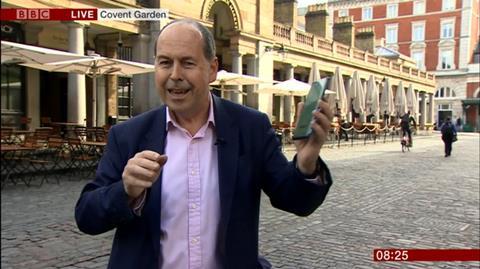Launch of EE’s 5G network today was marked by UK’s first ever live TV broadcast over a public 5G connection

BBC Breakfast has made the UK’s first live TV broadcast over a public 5G connection, using EE’s 5G network which launched today.
BBC technology correspondent Rory Cellan-Jones covered the launch of the UK’s first 5G network from Covent Garden on BBC Breakfast this morning.
Behind the scenes, his segment was also beamed back to BBC New Broadcasting House over the very same 5G network to be played out live in the show.
It’s the first time a public 5G network has been used by a production team for a live TV programme, demonstrating the potential that 5G has in broadcast production.
BT subsidiary EE launched its 5G network today in London, Cardiff, Belfast, Edinburgh, Birmingham and Manchester.
Live outside contributions can currently be sent back to production studios in a variety of ways, including existing 4G networks. However, 4G network links require multiple connections to provide the capacity to carry the live video feeds. In today’s 5G trial only one connection was needed, reducing both the complexity and cost of the production.
Specialised 5G modems were connected to BBC News cameras to take advantage of the new 5G network. The trial also allowed the teams to explore different encoding options to compress the video, allowing it to be sent back to New Broadcasting House, and decompressing it for live playout.
The BBC’s chief technology and product officer Matthew Postgate said: “5G is a hugely interesting area for us to explore, with potential to reduce the cost and complexity of outside broadcasts, and as a way of delivering content to audiences in the future.”
BT managing director of wholesale Alex Tempest said: “Whether on the street, in a stadium or on location, 5G provides a new dimension that can deliver the speed, efficiency and reliability that outside broadcasting requires.”
In addition to production trials, the BBC is also currently running a trial delivering live BBC Radio over 5G in Orkney, exploring how the technology might bring BBC programmes and services to audiences in rural areas.





























No comments yet